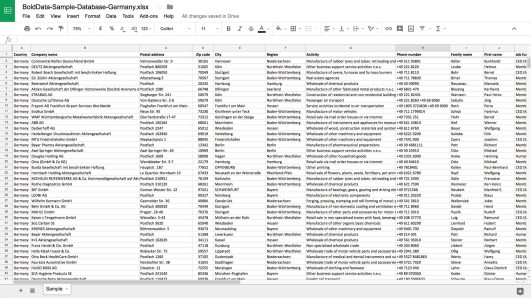Introduction
In today’s fast-paced business world, it’s essential to understand and manage data effectively. A company database is a central system that organizes various types of information into structured tables. This makes it easy to access data and supports decision-making processes that lead to business success.
An efficient company database is incredibly important. It allows businesses to use large amounts of data to gain insights, improve operations, and build strong relationships with clients. By implementing effective data management practices, companies can navigate the complexities of today’s market.
Key takeaway: In this article, we explore the different types of company databases, their benefits, and strategies for effective management to achieve optimal results.
Understanding Company Databases
A company database is a centralized storage system that is designed to systematically store and organize information. This setup ensures that data is easily accessible, manageable, and retrievable. At the core of a company database are structured tables, which arrange data into rows and columns, much like a spreadsheet. This structure makes it easy to query and analyze the data.
What Makes Up a Company Database?
Here are some key components that typically make up a company database:
- Customer Details: Information such as names, contact numbers, email addresses, and transaction history.
- Employee Records: Data on employee profiles, including personal information, job titles, salaries, and performance evaluations.
- Inventory Information: Details about products or materials in stock, including descriptions, quantities, and pricing.
- Financial Data: Records of financial transactions, balance sheets, income statements, etc.
These examples illustrate the wide range of data that can be stored in a company database. Each entry is carefully categorized to ensure clarity and precision.
Benefits of Centralized Data Storage
By centralizing data in a company database, businesses can enjoy several benefits:
Enhanced Accessibility: Authorized personnel can quickly access needed information from anywhere.Improved Consistency: Reduces data redundancy and inconsistency across different departments.Streamlined Operations: Facilitates seamless integration with various business applications.In simple terms, a well-maintained company database becomes the backbone of an organization’s data strategy. It not only stores critical information but also supports operational efficiency by providing structured insights that drive decision-making processes.
Exploring Different Types of Company Databases
A company database can take many forms, each suited to different types of data and business needs. Understanding these variations is crucial for selecting the right database solution.
Relational Databases
Relational Database Management Systems (RDBMS) are the backbone of many businesses. These databases organize data into structured tables that relate to one another, allowing for complex queries and integrity.
- Oracle and Microsoft SQL Server are two prominent examples of RDBMS. They excel in handling structured data and provide robust tools for data management, making them ideal for businesses with intricate data relationships.
NoSQL Databases
When dealing with unstructured data or when flexibility is a priority, NoSQL databases come into play. Unlike relational databases, NoSQL solutions don’t rely on structured tables.
- MongoDB and Cassandra are popular choices here. MongoDB is known for its document-based storage, while Cassandra provides a distributed architecture that ensures scalability and high availability.
Cloud Databases
Cloud databases offer the advantage of remote access and scalability. Hosted by leading cloud service providers, these databases allow businesses to store and manage their data over the internet rather than on-premises servers.
- With cloud databases, you gain benefits like reduced infrastructure costs and increased flexibility. Providers such as Amazon Web Services (AWS), Microsoft Azure, and Google Cloud Platform offer diverse options tailored to various business needs.
Each type of database comes with its unique features and advantages. Choosing the right one depends on factors like the nature of your data, budget constraints, and specific business objectives.
Benefits and Applications of Company Databases
A company database plays a crucial role in supporting informed decision-making processes within businesses. With structured and easily accessible data at their fingertips, managers and executives can quickly analyze trends, forecast outcomes, and make strategic decisions. This data-driven approach minimizes guesswork, leading to more accurate predictions and better risk management.
Company databases also drive operational improvements. By maintaining organized records of customer interactions, employee performance, and supply chain logistics, companies can streamline operations. For example:
- Customer Service: Access to comprehensive customer data allows for personalized service, improving client satisfaction.
- Human Resources: Employee databases facilitate efficient management of payroll, benefits, and performance reviews.
- Inventory Management: Real-time updates on stock levels help prevent overstocking or stockouts.
Beyond internal improvements, company databases are instrumental in acquiring new clients and building relationships. With detailed insights into market trends and consumer behavior, businesses can tailor marketing strategies to attract potential customers. Additionally:
- Targeted Marketing Campaigns: Leverage detailed demographic data to reach specific audience segments effectively.
- Customer Relationship Management (CRM): Utilize contact information and purchase history to foster long-term relationships with existing customers.
By integrating these applications, businesses not only enhance their internal processes but also expand their market reach. This dual benefit underscores the significance of understanding “What Is a Company Database?” as a tool for growth and sustainability in today’s competitive landscape. Each application highlights the database’s role as an essential asset in modern business strategy.
Sourcing Data for Effective Company Databases
Building an effective company database begins with sourcing accurate and reliable data. This often involves tapping into local trade registers across more than 200 countries. These registers provide a treasure trove of essential business information, ensuring databases are filled with up-to-date and comprehensive data. Utilizing such sources helps organizations maintain the integrity and precision of their databases, crucial for informed decision-making and strategic planning.
When sourcing data, the importance of using privacy-compliant channels cannot be overstated. With increasing privacy regulations worldwide, ensuring compliance is critical to mitigate legal risks and maintain trust with stakeholders. Data collection from public registries must align with privacy laws like GDPR in Europe or CCPA in California, emphasizing transparency and user consent.
Local trade registers serve as a key foundation for:
- Authenticity: Official records verify business legitimacy.
- Comprehensiveness: Access to detailed company profiles, including financial insights.
- Accuracy: Regular updates ensure current information
Adhering to privacy compliance when extracting this data not only safeguards the organization but also enhances the credibility of the database. By prioritizing privacy, companies demonstrate commitment to ethical standards, fostering stronger relationships with clients and partners.
Incorporating these practices ensures that company databases are not just vast but valuable assets that drive strategic growth.
Using Company Databases for Advanced Applications
Company databases are a valuable resource for training models and improving artificial intelligence (AI) applications. These databases contain a wide range of information that is essential for creating algorithms capable of learning from historical data to forecast future events.
1. Training Machine Learning Models
Machine learning relies heavily on large datasets, and company databases perfectly meet this requirement. By inputting extensive historical and real-time data from company databases into machine learning models, businesses can:
- Enhance predictive analytics
- Improve customer segmentation
- Optimize supply chain logistics
2. Enhancing AI Applications
AI systems depend on organized data to operate efficiently. With access to various company data—such as financial information and market trends—AI can:
- Automate decision-making processes
- Personalize customer interactions
- Predict market shifts
This results in more intelligent business strategies and streamlined operations.
By utilizing the vast amount of data stored in company databases, businesses not only improve their technological capabilities but also maintain a competitive edge in the market. The possibilities are endless—from customizing marketing campaigns to advancing product development—all made achievable through effective data utilization strategies aimed at extracting valuable insights from extensive datasets.
Challenges in Managing Company Databases and How to Overcome Them
Managing company databases comes with its own set of challenges. Understanding these obstacles helps businesses implement strategies for efficient data management.
1. Data Quality Issues
Maintaining high data quality is crucial. Incomplete, outdated, or incorrect data can lead to poor decision-making. Regular audits and validation processes ensure data accuracy, while implementing automated tools can help clean and standardize data.
2. Maintenance Costs
Keeping a database running involves significant expenses, from hardware and software to skilled personnel. Opting for cloud-based solutions can reduce infrastructure costs, offering scalability and flexibility without heavy upfront investments.
3. Security Concerns
Protecting sensitive information is paramount. Data breaches can have severe financial and reputational repercussions. Employing advanced encryption techniques and conducting regular security assessments fortify database defenses.
4. Integration Complexities
Businesses often use multiple systems that need seamless integration with the company database. Utilizing APIs and adopting middleware solutions streamline integration processes, ensuring smooth data flow across platforms.
Addressing these challenges involves proactive measures and strategic investment in technology and personnel. This enables companies to leverage their databases effectively, turning potential hurdles into opportunities for improvement.
The Future of Company Databases: Trends to Watch Out For
As technology rapidly evolves, future trends in company databases are set to revolutionize how businesses manage and utilize data.
Among these trends:
- Increased Adoption of AI and Machine Learning: Companies will increasingly rely on AI-driven analytics to extract insights from large datasets, enhancing decision-making processes.
- Cloud-Based Solutions: As cloud computing advances, more companies will shift towards cloud databases for scalability and flexibility in data storage and management.
- Enhanced Data Security Measures: With rising concerns about data privacy, robust security protocols will become a standard feature in database solutions.
- Integration with IoT Devices: The proliferation of IoT devices will lead to databases that can handle real-time data influxes, enabling more responsive business operations.
- Blockchain Technology: This decentralized approach may offer new ways to ensure data integrity and transparency within company databases.
Staying ahead of these trends is crucial for businesses aiming to leverage their data effectively in the competitive landscape.

